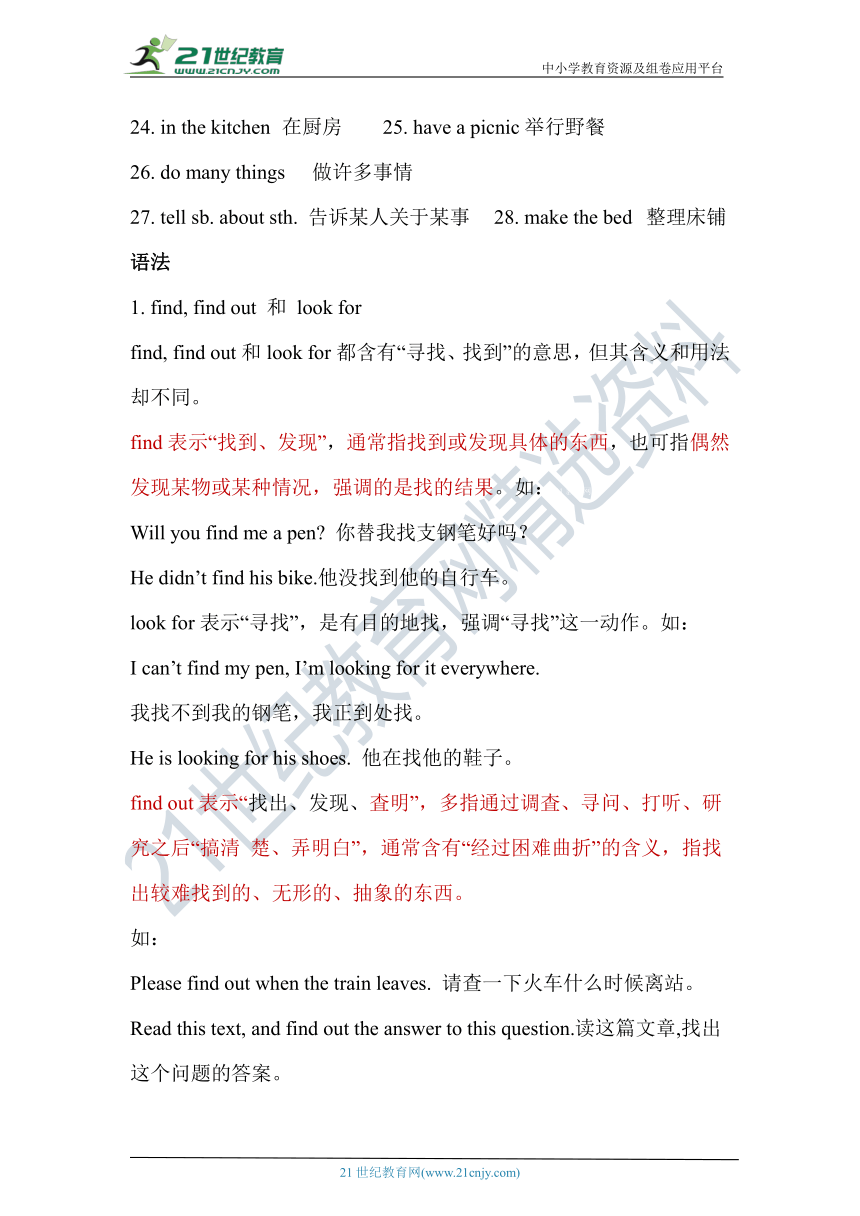Unit 6An interesting country 单元知识梳理
文档属性
| 名称 | Unit 6An interesting country 单元知识梳理 |  | |
| 格式 | doc | ||
| 文件大小 | 1.1MB | ||
| 资源类型 | 试卷 | ||
| 版本资源 | 牛津译林版 | ||
| 科目 | 英语 | ||
| 更新时间 | 2021-05-06 14:17:22 | ||
图片预览


文档简介
中小学教育资源及组卷应用平台
六年级下Unit An interesting country 单元知识梳理
语音
air/e?/: air chair fair hair pair repair stair airplane【来源:21·世纪·教育·网】
四会单词
1. country 国家 2. will 将要 3. learn 学习
4. welcome 欢迎 5. visitor参观者 6. like如,像
7. month 月
四会词组
1. learn about Australia 学习关于澳大利亚 2. next week 下周
3. find out 发现 4. before the lessons /before class 在课前
5. ask my e-friend in Australia问我的澳大利亚网友
6. send me some photos 发送给我一些照片
7. come from = be from 来自 8. on the Internet 在网上
9. read about... 读有关 10. look for 寻找
11. a beautiful city —座美丽的城市 12. welcome visitors 欢迎游客
13. every year 每年 14. come and visit China 来参观中国
15. read books about... 读有关……的书
16. an interesting country 一个有趣的国家
17. send an email to my friend给我朋友发封电子邮件
18. next month 下个月 19. over there 在那儿
20. the Great Wall 长城 21. read newspapers 看报纸
22. cook dinner 做晚饭 23. wait and see 等着瞧
24. in the kitchen 在厨房 25. have a picnic 举行野餐
26. do many things 做许多事情
27. tell sb. about sth. 告诉某人关于某事 28. make the bed 整理床铺
语法
1. find, find out 和 look for
find, find out和look for都含有“寻找、找到”的意思,但其含义和用法却不同。
find表示“找到、发现”,通常指找到或发现具体的东西,也可指偶然发现某物或某种情况,强调的是找的结果。如:21教育网
Will you find me a pen? 你替我找支钢笔好吗?
He didn’t find his bike.他没找到他的自行车。
look for表示“寻找”,是有目的地找,强调“寻找”这一动作。如:
I can’t find my pen, I’m looking for it everywhere. 21cnjy.com
我找不到我的钢笔,我正到处找。
He is looking for his shoes. 他在找他的鞋子。
find out表示“_??????????????°???_査明”,多指通过调査、寻问、打听、研究之后“搞清 楚、弄明白”,通常含有“经过困难曲折”的含义,指找出较难找到的、无形的、抽象的东西。21·cn·jy·com
如:
Please find out when the train leaves. 请查一下火车什么时候离站。
Read this text_,_and__find out the answer to this question.读这篇文章,找出这个问题的答案。www.21-cn-jy.com
2.learn 和 learn about
learn表示“学习,记住”。如:
I'm trying to learn English.我正在努力学习英语。
What do you want to leam?你想学习什么?
learn about表示“ T解,知道’获悉。如:
I am sorry to learn about the accident.获悉此次事故我感到很遗憾。
I learn about cooking from my mother.我从妈妈那学习做饭。
3.welcome的用法
名词,表示“欢迎”,作可数名词。如:
She gave me a cool welcome.她冷淡地迎接我。
I received a warm welcome.我受到了热烈欢迎。
动词,表示“欢迎”。如:
We welcome his help.我们欢迎他的帮助。
I welcomed them to Shanghai.我欢迎他们来上海。
形容词,表示“受欢迎的”。如:
You're welcome to borrow my pen.欢迎你借我的钢毛。
She is a welcome teacher.她是一位受欢迎的教师。
4. will引导的一般将来时
常与表示一般将来时的时间状语连用。
如:tomorrow(_????¤????,th_e day after tomorrow(后 天),soon(很快),in three days(三天后),this year(今年),next week(下周),in the future(在将来), some day(某一天)...21世纪教育网版权所有
will和主语写在一起时,常简略为“’ll”。
I will = I’ll我将 we will = we'll 我们将 he will = he'll 他将
you will = you'll 你/你们将 they will = they'll 他们将 she will = she'll 她将2·1·c·n·j·y
肯定句结构:主语+ will +动词原形+其他。如:
They will find _out_ab_out this country next week. = They'll find out about this country next week. 他们下周将查找关于这个国家的信息。
She will g_o_to_t_he library tomorrow. = She'll go to the library tomorrow.
她明天将会去图书馆。
_21?????????è?????(www.21cnjy.com)_
六年级下Unit An interesting country 单元知识梳理
语音
air/e?/: air chair fair hair pair repair stair airplane【来源:21·世纪·教育·网】
四会单词
1. country 国家 2. will 将要 3. learn 学习
4. welcome 欢迎 5. visitor参观者 6. like如,像
7. month 月
四会词组
1. learn about Australia 学习关于澳大利亚 2. next week 下周
3. find out 发现 4. before the lessons /before class 在课前
5. ask my e-friend in Australia问我的澳大利亚网友
6. send me some photos 发送给我一些照片
7. come from = be from 来自 8. on the Internet 在网上
9. read about... 读有关 10. look for 寻找
11. a beautiful city —座美丽的城市 12. welcome visitors 欢迎游客
13. every year 每年 14. come and visit China 来参观中国
15. read books about... 读有关……的书
16. an interesting country 一个有趣的国家
17. send an email to my friend给我朋友发封电子邮件
18. next month 下个月 19. over there 在那儿
20. the Great Wall 长城 21. read newspapers 看报纸
22. cook dinner 做晚饭 23. wait and see 等着瞧
24. in the kitchen 在厨房 25. have a picnic 举行野餐
26. do many things 做许多事情
27. tell sb. about sth. 告诉某人关于某事 28. make the bed 整理床铺
语法
1. find, find out 和 look for
find, find out和look for都含有“寻找、找到”的意思,但其含义和用法却不同。
find表示“找到、发现”,通常指找到或发现具体的东西,也可指偶然发现某物或某种情况,强调的是找的结果。如:21教育网
Will you find me a pen? 你替我找支钢笔好吗?
He didn’t find his bike.他没找到他的自行车。
look for表示“寻找”,是有目的地找,强调“寻找”这一动作。如:
I can’t find my pen, I’m looking for it everywhere. 21cnjy.com
我找不到我的钢笔,我正到处找。
He is looking for his shoes. 他在找他的鞋子。
find out表示“_??????????????°???_査明”,多指通过调査、寻问、打听、研究之后“搞清 楚、弄明白”,通常含有“经过困难曲折”的含义,指找出较难找到的、无形的、抽象的东西。21·cn·jy·com
如:
Please find out when the train leaves. 请查一下火车什么时候离站。
Read this text_,_and__find out the answer to this question.读这篇文章,找出这个问题的答案。www.21-cn-jy.com
2.learn 和 learn about
learn表示“学习,记住”。如:
I'm trying to learn English.我正在努力学习英语。
What do you want to leam?你想学习什么?
learn about表示“ T解,知道’获悉。如:
I am sorry to learn about the accident.获悉此次事故我感到很遗憾。
I learn about cooking from my mother.我从妈妈那学习做饭。
3.welcome的用法
名词,表示“欢迎”,作可数名词。如:
She gave me a cool welcome.她冷淡地迎接我。
I received a warm welcome.我受到了热烈欢迎。
动词,表示“欢迎”。如:
We welcome his help.我们欢迎他的帮助。
I welcomed them to Shanghai.我欢迎他们来上海。
形容词,表示“受欢迎的”。如:
You're welcome to borrow my pen.欢迎你借我的钢毛。
She is a welcome teacher.她是一位受欢迎的教师。
4. will引导的一般将来时
常与表示一般将来时的时间状语连用。
如:tomorrow(_????¤????,th_e day after tomorrow(后 天),soon(很快),in three days(三天后),this year(今年),next week(下周),in the future(在将来), some day(某一天)...21世纪教育网版权所有
will和主语写在一起时,常简略为“’ll”。
I will = I’ll我将 we will = we'll 我们将 he will = he'll 他将
you will = you'll 你/你们将 they will = they'll 他们将 she will = she'll 她将2·1·c·n·j·y
肯定句结构:主语+ will +动词原形+其他。如:
They will find _out_ab_out this country next week. = They'll find out about this country next week. 他们下周将查找关于这个国家的信息。
She will g_o_to_t_he library tomorrow. = She'll go to the library tomorrow.
她明天将会去图书馆。
_21?????????è?????(www.21cnjy.com)_
